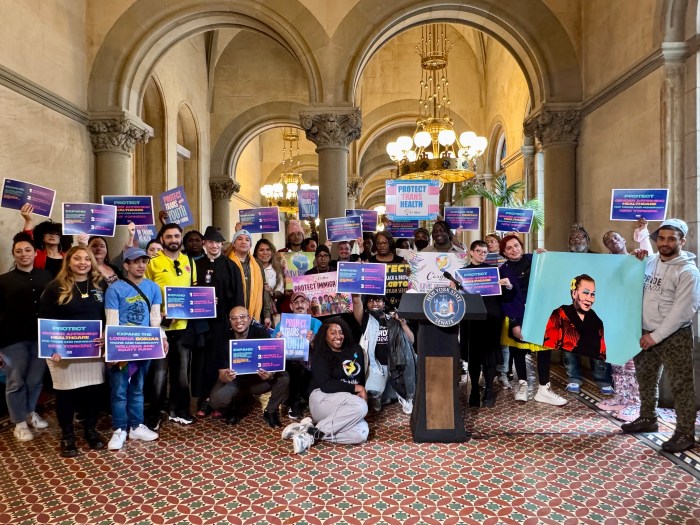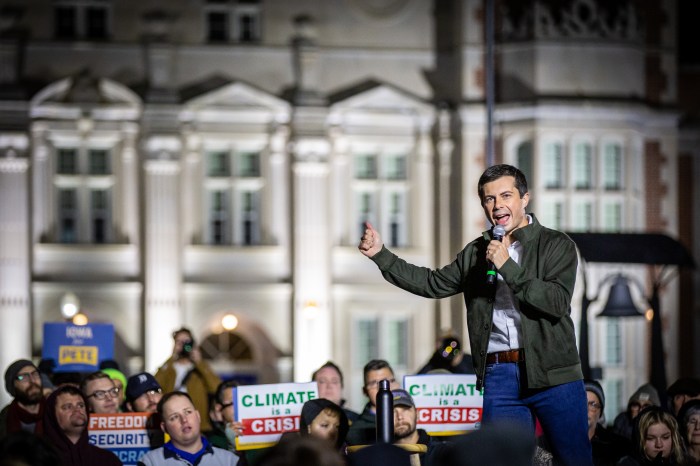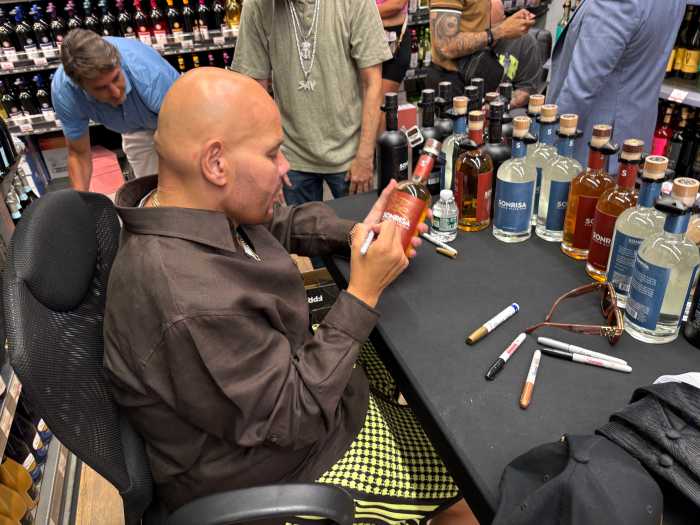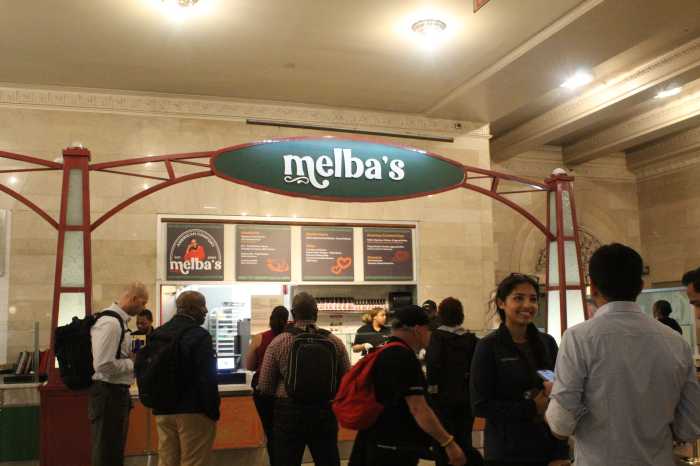Ending a 16-year court battle, religious groups, many of them virulently anti-gay and part of a “church planting” movement to evangelize students, were finally stopped from using New York City public schools for regular worship services on February 12.
But state and city officials — including pro-gay politicians such as Public Advocate Bill de Blasio and Comptroller John Liu — are pushing to change state law to allow the services.
Manhattan Borough President Scott Stringer opposes a change to the policy, while out lesbian City Council Speaker Christine Quinn had not taken a public stand by press time, but told Gay City News on February 4 that she intends to do so.
Governor Andrew Cuomo has also not come off the sidelines on this issue.
The State Senate, on February 6, voted 52-7 to approve a bill that would compel the city to allow the worship services in public schools. Democratic Assembly Speaker Sheldon Silver told Gay City News that the bill is “overly broad,” but that his members are open to a compromise on the issue.
The measure is strongly opposed by veteran Manhattan Democratic Assemblymembers Deborah Glick, a West Village out lesbian, and Dick Gottfried of Chelsea. State Senator Tom Duane, an out gay Chelsea Democrat, voted against the bill and told Gay City News that religious groups should “share space with other churches,” not use public schools.
It is uncertain what a compromise would look like, but Silver, in comments to this newspaper, said the Senate bill raised concerns about the “regularity” of religious access it would allow and the public subsidy of worship often involved. Some church groups have paid as little as $12 for use of school space on Sundays. The speaker said that based on Supreme Court precedent, there is a distinction between access for regular worship and use for specific events at which prayer is a more incidental factor, such as a Seder celebration.
Donna Lieberman, executive director of the New York Civil Liberties Union (NYCLU), which opposes the bill, said, “I don’t know that a compromise is available.”
Last summer, the US Court of Appeals for the Second Circuit in Manhattan upheld the constitutionality of the city’s existing law prohibiting worship services in public schools. In December, the US Supreme Court refused to review that ruling.
The Second Circuit decision ended an injunction in place since 2001 that resulted from a lawsuit brought by the Bronx Household of Faith.
Jane Gordon, senior counsel for the city’s Law Department in defending against the Bronx Household suit, said, “Like other community organizations, religious congregations are able to use public school space for after-school programs and a host of other activities and events. However, public school buildings, which are funded by taxpayers’ dollars and used primarily by the city’s diverse public school children, should not be used as houses of worship or to subsidize worship.”
The state bill now under consideration forbids school administrators from regulating the use of their space in a way “that would result in the exclusion or limitation of speech, during non-school hours, even where students may be present, including speech that expresses religious conduct or viewpoints.”
“What does that mean?,” asked East Side Democratic Councilwoman Jessica Lappin at a February 2 City Council Education Committee hearing on a resolution supporting the state bill. “It means the Department of Education wouldn’t be allowed to turn away any groups at all, religious or otherwise. Not even the Ku Klux Klan or a pornography club could be denied.”
The bill would change schools from “limited open forums” with some say over the kind of groups appropriate to meet there to completely “open forums” that would not be allowed to use their discretion in renting space, an alarming prospect to some educators and a concern Silver mentioned.
Jay Worona, general counsel to the New York State School Boards Association, testified, “Although the proposed legislative language is clearly not intended to require school districts throughout the state to permit individuals to secure access to school facilities after school hours for the purpose of promoting hateful, discriminatory messages, that is indeed a very real unintended consequence.”
The Village Church, which has been meeting in PS 3 on Hudson Street in the West Village since 2003, runs an ex-gay ministry called GAME — Gender Affirming Ministry Endeavor — which is part of the Exodus International Church, a leading proponent of the discredited “reparative therapy” approach to “curing the gays.”
Democratic Councilman Fernando Cabrera, the chief sponsor of the resolution and senior pastor of New Life Outreach International in the Bronx, led a march of 3,500 across the Brooklyn Bridge on January 29 to protest the ban.
While Cabrera sought to minimize the depiction of the growth of worship services as an “Occupy the Schools” movement, the number of worship services weekly in the public schools has grown exponentially — increasing to as many as 160 — since the Bronx Household of Faith won its 2001 injunction. The congregation’s legal argument relied on the Supreme Court’s Good News v. Milford Central School ruling that allowed religious meetings in schools.
In “The Good News Club: The Christian Right’s Stealth Assault on America’s Children,” published last month, Katherine Stewart argues that the “real mission” of Good News Clubs in schools is to “convert children to fundamentalist Christianity and encourage them to proselytize to their ‘unchurched’ peers, all the while promoting the false but unavoidable impression among the children that its activities are endorsed by the school.”
She also documents how leaders “of the church-planting movement have declared their ambition to turn all 1,200 of New York City’s schools into churches.”
Councilman Daniel Dromm of Jackson Heights, an out gay Democrat, objected to the resolution supporting the state bill on December 8 or it would have passed the Council. Since then, he has led the fight to defeat the resolution and gotten several colleagues to drop their support for it.
Dromm wrote to his fellow Council members, “I believe allowing churches that preach virulent homophobia in public schools violates not only the First Amendment’s Establishment Clause but also New York City law.”
On his church’s website, Pastor Robert Hall of the Bronx Household of Faith responded to the court ruling against his church and to the passage of marriage equality in New York last year by writing, “Both decisions refuse to recognize the authority of God, creator and sovereign of the universe, as the authority above the state.”
In response to a question from Dromm, Hall acknowledged that he “would like to see” Christian congregations such as his meeting in all public schools in the city.
The 700-member New Frontier Church holds three worship services, conducted in Korean, every Sunday in PS 11 in Gottfried’s district. Pastor Inhyun Ryu testified that the congregation has made “structural improvements” to the school, improved the air conditioning, and donated computers to the students “but never left a donor ID on them.”
Pastor Stephen Leung of Ascension Church, which meets at PS 101 in Forest Hills, said, “We don’t proselytize children and do not exclude anyone from our worship services.” If the city policy stands, “it is ideologically driven,” he argued. “Folks like us don’t feel welcome anymore.”
Matthew Stewart, a parent of children in PS 6 on the Upper East Side, said he investigated the Morning Star Church that meets there.
“The church dominates the facility,” he said. “Part of the stage was used for their storage,” something that is not supposed to be allowed. “Teachers had to ask them not to use school supplies,” he said, “and I saw one pastor praying over children’s pictures on the walls of the school.”
Stewart said he was “outraged” that “the blending led my child to develop the false impression that school and church are blended.”
While Speaker Quinn has not yet taken a public stance on the Council resolution, when asked by Gay City News about her view of the matter, she noted that at least three Council members had recently removed their names from it — Democrats Melissa Mark-Viverito of Manhattan and Karen Koslowitz and out gay Jimmy van Bramer of Queens.
Still, the resolution continues to enjoy majority support, including from pro-gay members such as Democrats Letitia James of Brooklyn and Margaret Chin of Lower Manhattan.
The city’s Department of Education (DOE) allows outside groups to use school facilities at a nominal cost when they are not being used by the schools themselves. Religious groups are allowed to have meetings in these spaces, but existing state law explicitly authorizes the city to draw the line at worship services.
The Bronx Household of Faith case decided last summer by the Second Circuit was argued by the right-wing Alliance Defense Fund (ADF), which has challenged marriage equality and other LGBT rights advances nationwide. The court wrote that the DOE could “reasonably worry that the regular, long-term conversion of schools into state-subsidized churches on Sundays would violate the Establishment Clause by reason of public perception of endorsement.”
The majority 2-1 decision also stated, “The exclusion applies only to the conduct of a certain type of activity — the conduct of worship services — and not to the free expression of religious views associated with it.”
The majority noted that since schools were most often empty and available for use by outside groups only on Sundays, it favored “Christian worship” and created “a very substantial appearance of governmental endorsement of religion” — another factor Silver mentioned in his comments to Gay City News. The DOE, the court said, had “a strong basis to fear that permitting such use would violate the Establishment Clause.”
After the US Supreme Court declined to review the ruling in December, the city gave the religious groups until February 12 to find alternative space. The defeated religious groups are going back into court this week in an effort to obtain an injunction to get back into the schools — in a procedural maneuver known as an Article 78 motion that the NYCLU’s Lieberman termed a “Hail Mary pass” that would not succeed.’
Silver said the Assembly would take no action on the Senate bill or a compromise until the Article 78 issue is resolved.
Jordan Lorence, the combative ADF senior counsel who lost the Bronx case — and is active in the group’s other anti-gay litigation around the country — insisted that of the top 50 school districts in the country, only New York bars worship services in schools.
“Nothing in the Constitution prohibits it,” he testified. “Can’t explain why the Supreme Court declined to hear the case.”
The DOE issued a statement saying, “Public school buildings, which are funded by taxpayers’ dollars, should not be used as houses of worship or to subsidize worship. This policy, which is based on important constitutional concerns, has been challenged and upheld by the appeals court. Organizations, including churches and synagogues and mosques, that wish to use public school space for after-school programs or community events or basketball leagues or Bible study classes are welcome. But public school space cannot and should not be used for worship services, especially because school space is not equally available to all faiths. The DOE respects and recognizes the contributions religious congregations make to their communities and has consistently sought in good faith to minimize any disruption caused once the court injunction was lifted.”
The DOE’s regulations (at tinyurl.com/6naa2va) mandate that groups renting school facilities may not “exclude persons on the basis of any impermissible discriminatory reason.”
Pastor Jack Roberts of Bronx Household of Faith, testified, “Gay and lesbian people can come,” but not become members. “We don’t allow people who are not baptized or who have a lifestyle contrary to the word of God.”
Jonathan Willner, a Brooklyn teacher, testified, “I am outraged that [these religious groups] can use our schools to preach hatred. Any religious group must be required to eliminate anti-gay rhetoric and respect equality. To do any less would be discriminating.”
Marci Hamilton, a former clerk for Supreme Court Justice Sandra Day O’Connor and professor at Cardozo School of Law, specializes in church/ state relations and constitutional law. She testified that the Second Circuit ruled that the schools “could not and should not” be open to houses of worship.
“If the Establishment Clause stands for anything, it must stand for the notion that it is not suitable for public schools to be churches,” she said.
Hamilton added, “Bronx Household of Faith is not open to the general public. Its exclusionary practices, while fine for a religious organization occupying its own rented or purchased space, are intolerable in a public school.”
Manhattan Democratic Councilman Robert Jackson, chair of the Education Committee, called Hamilton’s testimony her “opinion” and the “opinion” of the Second Circuit.
“These are the facts,” Hamilton replied.
Jackson said that while the court held that the city’s ban was constitutional, it did not say that a policy allowing for worship services was necessarily unconstitutional.
Lieberman of the NYCLU said, “The church that gets to pray in school every week is likely to be viewed as the favorite by the kids who go to the school and the community at large. It gives kids the impression that one religious group is favored over others.”
She blasted the bill as requiring schools “to subsidize churches” and as “devastating for the separation of church and state.”
Asked about these constitutional concerns, de Blasio, who as public advocate has authority to place his name on Council bills and resolutions, did not return a call for comment. His press office referred to his written statement: “There is indeed a line between church and state, but common sense and fairness dictate that the longstanding practice of allowing these institutions to rent space from the city — as thousands of other organizations do — is hardly a transgressive one.”
The only reason that there was a “longstanding practice,” however, was that the religious groups kept getting injunctions against the city’s enforcement of even longer standing policy. It was never city policy to allow the access.
Dromm told Gay City News, “I am frustrated that sometimes my colleagues don’t seem to take these churches’ virulent homophobia as seriously as it should be taken. It is an outrage that progressive people aren’t as outraged as is necessary. These issues are at the core of determining whether you’re a progressive.”
Allen Roskoff, president of the Jim Owles Liberal Democratic Club, an LGBT group, said “the gay community is furious” over the bill, and he confronted Councilmembers Jackson and James over their support for the resolution.
“Tish said these people take care of people with AIDS, but I said it is not right for government to give them places to pray,” he said.
The Freedom from Religion Foundation has an extensive summary of the legal cases involved in the movement to place churches in schools at tinyurl.com/798ktjx.
The Bloomberg administration is fighting the state bill. ADF’s Lorence wrote on the group’s website that, in Albany, “I ran into School Chancellor Dennis Walcott, who had been lobbying lawmakers to defeat the bill. The NYC School Chancellor is not going to travel to Albany unless he is concerned that the bill would pass.”
Mayor Michael Bloomberg, who distinguished himself defending the right of an Islamic group to open a cultural center downtown near Ground Zero, spoke up on February 13 about the longstanding policy of barring worship services in schools.
“I’ve always thought that one of the great things about America is that we keep a separation [between church and state] and the more clear that separation is, the more those people who want to be able to practice their religion will have the opportunity to do so.”





























